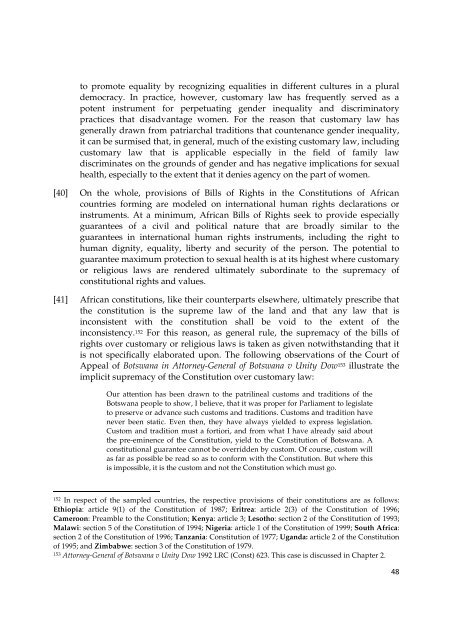sexual health and human rights in the african region - The ICHRP
sexual health and human rights in the african region - The ICHRP
sexual health and human rights in the african region - The ICHRP
You also want an ePaper? Increase the reach of your titles
YUMPU automatically turns print PDFs into web optimized ePapers that Google loves.
to promote equality by recogniz<strong>in</strong>g equalities <strong>in</strong> different cultures <strong>in</strong> a plural<br />
democracy. In practice, however, customary law has frequently served as a<br />
potent <strong>in</strong>strument for perpetuat<strong>in</strong>g gender <strong>in</strong>equality <strong>and</strong> discrim<strong>in</strong>atory<br />
practices that disadvantage women. For <strong>the</strong> reason that customary law has<br />
generally drawn from patriarchal traditions that countenance gender <strong>in</strong>equality,<br />
it can be surmised that, <strong>in</strong> general, much of <strong>the</strong> exist<strong>in</strong>g customary law, <strong>in</strong>clud<strong>in</strong>g<br />
customary law that is applicable especially <strong>in</strong> <strong>the</strong> field of family law<br />
discrim<strong>in</strong>ates on <strong>the</strong> grounds of gender <strong>and</strong> has negative implications for <strong>sexual</strong><br />
<strong>health</strong>, especially to <strong>the</strong> extent that it denies agency on <strong>the</strong> part of women.<br />
[40] On <strong>the</strong> whole, provisions of Bills of Rights <strong>in</strong> <strong>the</strong> Constitutions of African<br />
countries form<strong>in</strong>g are modeled on <strong>in</strong>ternational <strong>human</strong> <strong>rights</strong> declarations or<br />
<strong>in</strong>struments. At a m<strong>in</strong>imum, African Bills of Rights seek to provide especially<br />
guarantees of a civil <strong>and</strong> political nature that are broadly similar to <strong>the</strong><br />
guarantees <strong>in</strong> <strong>in</strong>ternational <strong>human</strong> <strong>rights</strong> <strong>in</strong>struments, <strong>in</strong>clud<strong>in</strong>g <strong>the</strong> right to<br />
<strong>human</strong> dignity, equality, liberty <strong>and</strong> security of <strong>the</strong> person. <strong>The</strong> potential to<br />
guarantee maximum protection to <strong>sexual</strong> <strong>health</strong> is at its highest where customary<br />
or religious laws are rendered ultimately subord<strong>in</strong>ate to <strong>the</strong> supremacy of<br />
constitutional <strong>rights</strong> <strong>and</strong> values.<br />
[41] African constitutions, like <strong>the</strong>ir counterparts elsewhere, ultimately prescribe that<br />
<strong>the</strong> constitution is <strong>the</strong> supreme law of <strong>the</strong> l<strong>and</strong> <strong>and</strong> that any law that is<br />
<strong>in</strong>consistent with <strong>the</strong> constitution shall be void to <strong>the</strong> extent of <strong>the</strong><br />
<strong>in</strong>consistency. 152 For this reason, as general rule, <strong>the</strong> supremacy of <strong>the</strong> bills of<br />
<strong>rights</strong> over customary or religious laws is taken as given notwithst<strong>and</strong><strong>in</strong>g that it<br />
is not specifically elaborated upon. <strong>The</strong> follow<strong>in</strong>g observations of <strong>the</strong> Court of<br />
Appeal of Botswana <strong>in</strong> Attorney-General of Botswana v Unity Dow 153 illustrate <strong>the</strong><br />
implicit supremacy of <strong>the</strong> Constitution over customary law:<br />
Our attention has been drawn to <strong>the</strong> patril<strong>in</strong>eal customs <strong>and</strong> traditions of <strong>the</strong><br />
Botswana people to show, I believe, that it was proper for Parliament to legislate<br />
to preserve or advance such customs <strong>and</strong> traditions. Customs <strong>and</strong> tradition have<br />
never been static. Even <strong>the</strong>n, <strong>the</strong>y have always yielded to express legislation.<br />
Custom <strong>and</strong> tradition must a fortiori, <strong>and</strong> from what I have already said about<br />
<strong>the</strong> pre-em<strong>in</strong>ence of <strong>the</strong> Constitution, yield to <strong>the</strong> Constitution of Botswana. A<br />
constitutional guarantee cannot be overridden by custom. Of course, custom will<br />
as far as possible be read so as to conform with <strong>the</strong> Constitution. But where this<br />
is impossible, it is <strong>the</strong> custom <strong>and</strong> not <strong>the</strong> Constitution which must go.<br />
152 In respect of <strong>the</strong> sampled countries, <strong>the</strong> respective provisions of <strong>the</strong>ir constitutions are as follows:<br />
Ethiopia: article 9(1) of <strong>the</strong> Constitution of 1987; Eritrea: article 2(3) of <strong>the</strong> Constitution of 1996;<br />
Cameroon: Preamble to <strong>the</strong> Constitution; Kenya: article 3; Lesotho: section 2 of <strong>the</strong> Constitution of 1993;<br />
Malawi: section 5 of <strong>the</strong> Constitution of 1994; Nigeria: article 1 of <strong>the</strong> Constitution of 1999; South Africa:<br />
section 2 of <strong>the</strong> Constitution of 1996; Tanzania: Constitution of 1977; Ug<strong>and</strong>a: article 2 of <strong>the</strong> Constitution<br />
of 1995; <strong>and</strong> Zimbabwe: section 3 of <strong>the</strong> Constitution of 1979.<br />
153 Attorney-General of Botswana v Unity Dow 1992 LRC (Const) 623. This case is discussed <strong>in</strong> Chapter 2.<br />
48
















